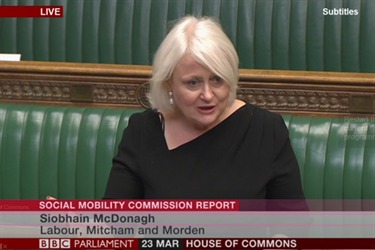
Thank you Mr Speaker.
And thank you to the Hon Members for Loughborough and Sheffield Hallam, and my Hon Friend, the Member for Manchester Central for securing this important debate.
May I begin by saying I wholeheartedly support their article in last week’s Observer that make clear that grammar schools are not the answer to social mobility.
I was proud to be part of the last Labour government, where social mobility and education were an absolute priority.
But as the Social Mobility Commission’s ‘State of the Nation’ report set out last year, under the present government, we are slipping back decades in terms of progress.
Those born in Britain in the 1980s are the first generation of people since 1945 to start their careers on a lower income than their parents.
A child living in one of England's most disadvantaged areas is 27 times more likely to go to an inadequate school than a child in an affluent areas.
Just 5% of children receiving free school meals will secure five A-grades at GCSE.
Children from low-income homes are 30% more likely to drop out of education than their wealthier classmates with similar GCSE grades.
And overall, pupils on free school meals lag behind their wealthier counterparts by about 20 months by secondary school age.
For working people in my community, the link between social class and professional success is more entrenched than ever.
Only one in eight children from low-income backgrounds is likely to earn a high salary as an adult.
And ordinary working-class people make up only 4% of doctors, 6% of barristers and 11% of journalists.
This is a whole generation of talent which is being frozen out.
But I want to make it clear today that grammar schools are not the answer.
The House of Commons Library’s own research briefing from earlier this month states, and I quote:
‘Pupils at grammar schools are much less likely than average to … be eligible for free school meals than average.’Indeed, only 2.6% of pupils at grammar schools are eligible for free school meals, a well-understood signifier of poverty. But 14% of all students are eligible for free school meals nationwide.
Part of the reason that poor students are so underrepresented at grammar schools is because the attainment gap between the richer and poorer students is clear even when only a few years old.
However, the library briefing states that:
‘[of the] 6.9% of pupils eligible for Free School Meals with high prior attainment who are near selective schools, only 2.4% actually attended a grammar school.’So let’s be clear – grammar schools don’t even work for the very brightest poor students, never mind the average or below average student.
Grammar schools educate a minority of our students, educating just 5% of state school students.
So while this government wastes time banging on about grammars, the needs of 95% of our state school students are being ignored.
When I talk about social mobility, I’m not just talking about the brightest poor students. I’m talking about the poorest average Joes too, who deserve no less to succeed in life through hard work.
What we need, more than ever, is a real prioritisation of comprehensive school education.
If we don’t have that, then we will never address the national scandal of white-working class under-achievement in this country.
Let’s have no doubt at all: this is a class issue, and in particular a white working class issue, above all.
Boys and girls receiving Free School Meals are consistently the lowest performing groups at GCSE level amongst both genders.
Only 32% of working-class white British students (receiving Free School Meals) achieved the GSCE benchmark last year.
This is compared to 44% of mixed race students, 59% of Bangladeshi students, 42% of Black Caribbean students, and 47% of Pakistani students – all also receiving Free School Meals.
This is because the educational attainment of white working class students has improved much more slowly than almost all other ethnic groups over the past ten years.
But a good school can be life-changing.
Take the Harris Academy chain in South London in comparison to national averages.
Last year, Harris Academy Merton achieved some record GCSE results, with a staggering 77% of students achieving 5 A*-C grades including Maths and English. Compare this to the national average of just 54%.
These schools should be our ideals, and not grammar schools.
The Pupil Premium needs to be used to ensure that disadvantaged pupils receive the focused support they need.
We need to give the academically average students from poor backgrounds better alternatives to university.
Social mobility is not just about the children at the very top doing well.
It is about all children are able to aspire and surpass expectations, including the average and below average students.
I hope this is an aim we can all share.
ENDS